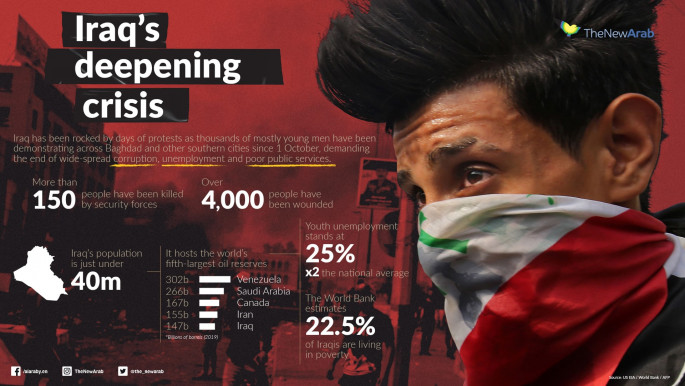Iran-backed militias deployed snipers to quash anti-government protests
Iran-aligned militias deployed snipers on Baghdad's rooftops during mass protests this month calling for the Iraqi government's ouster, taking it upon themselves to squash the movement and bolster the incumbent government.
The Popular Mobilisation Forces (PMF), a collection of mostly Shia militias known in Arabic as Hashd al-Shaabi, allegedly stationed fighters to shoot those participating in mass protests against corruption, unemployment and poor public services that swept the country last month.
The deadly violence during protests against the government of Iraqi Prime Minister Adel Abdul Mahdi is believed to have left more than 100 dead and over 6,000 wounded.
Two Iraqi security officials told Reuters that the leaders of Iran-aligned militias made their own decision to aid the Baghdad government in quashing mass protests.
"We have confirmed evidence that the snipers were elements of militias reporting directly to their commander instead of the chief commander of the armed forces," one of the Iraqi security sources told Reuters.
"They belong to a group that is very close to the Iranians."
 |
The second Iraqi security source revealed "militia men clad in black shot protesters on the third day of unrest", a day that sawmore than 50 people killed.
The snipers were directed by head of security for Hashd al-Shaabi, Abu Zainab al-Lami, according to the sourc
Read more: Why are people protesting in Iraq?
The source added that al-Lami was directed to suppress the growing protest movement by senior militia commanders.
A spokesperson for Hashd al-Shaabi, Ahmed al-Assadi, denies the reports.
"No members were present in the protest areas. None of the elements of the Hashid took part in confronting protesters," al-Assadi told Reuters.
Iranian influence
Prime Minister Mahdi, whose administration has been in power for one year, is backed by various Iran-linked "armed groups and political factions", according to Reuters.
Senior commanders from Iran's Revolutionary Guard traveled to Iraq in the early days of the protests to meet with intelligence and security officials, a diplomat told the news agency, and continued to offer advice as the situation developed.
A commander from an Iran-backed militia, who claims not to have been involved in actions against protestors, said Iran closely advised those seeking to quash the protests.
|
"After two days, they jumped in and supplied the government and militias with intelligence," the senior commander leader told Reuters.
"Iranian advisors insisted on having a role and warned us that the ongoing protests, if not reversed, will undermine the government of Abdul Mahdi."
Iran's Supreme Leader Ayatollah Ali Khamenei said "enemies" were trying to drive a wedge between Tehran and Baghdad in a tweet last week Monday following deadly unrest in neighbouring Iraq.
"#Iran and #Iraq are two nations whose hearts & souls are tied together... Enemies seek to sow discord but they've failed & their conspiracy won't be effective," Khamenei was quoted as saying on his office's Twitter account.
Arrest warrants
Iraq's judiciary issued arrest warrants for a number of officers and security forces charged with using excessive force and killing demonstrators in mass protests that swept the country last month, a Baghdad official has said.
The news comes several days before the publication of a government investigation into the deadly violence during protests that left more than 100 dead.
Iraqi authorities have come under fire for their slow response to mounting protester death toll.
"For more than a decade, Iraqi governments have said they would investigate abuses by security forces but haven't done so," said Sarah Leah Whitson, Middle East director at Human Rights Watch, in a statement.
Amnesty International - which said it interviewed eight activists and journalists who described seeing protesters killed by snipers - urged authorities to properly investigate the "use of excessive and deadly force".
Security forces did not protect protesters from sniper fire, Amnesty said, "nor have police intervened and arrested anyone responsible for firing at demonstrations".
Comment: Iraq's lost generation
Authorities initially blamed "unidentified snipers" and infiltrating "saboteurs" but later acknowledged that the military had used "excessive force" in the mainly Shia area of Sadr City in Baghdad.
Footage circulated on social media showed demonstrators being fatally shot, or running for cover under heavy fire.
Iraq's populist cleric Muqtada Sadr on Tuesday urged millions of worshippers to protest against corruption during the annual Arbaeen pilgrimage, the largest in Shia Islam.
The pilgrimage to the holy city of Karbala takes place on Saturday.
 |
Agencies contributed to this report.
Follow us on Twitter: @The_NewArab



